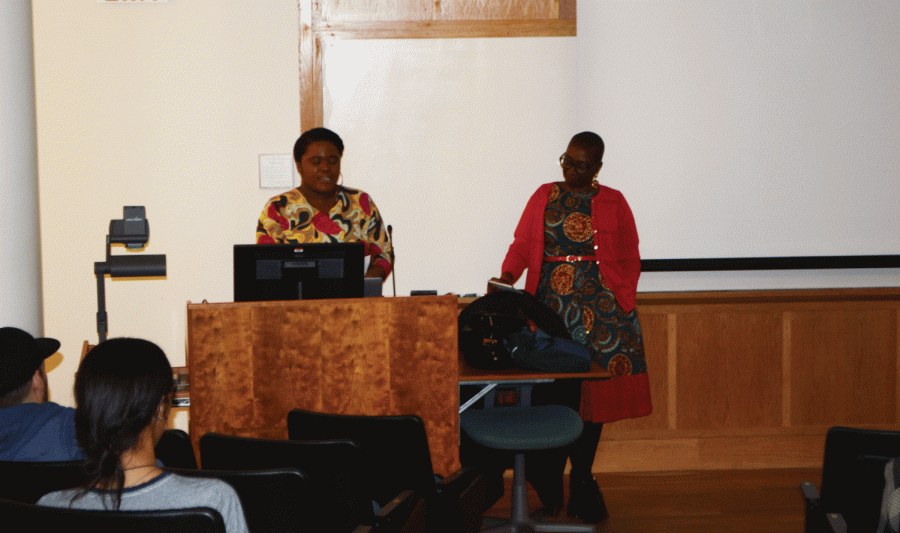Nigerian Author ‘Decolonizes’ African Feminism
Professor Oyeronke Oyewumi engaged an enthusiastic audience in her analysis of African feminism and its issues.
On Thursday, November 3, Colgate’s African Student Union (ASU) and the Africana and Latin American Studies (ALST) department hosted Nigerian author and Associate Professor of Sociology at Stony Brook University Oyeronke Oyewumi for a discussion on the complexity of African feminism and its colonial roots.
Oyewumi has published several works dealing with the role of white supremacy in the construction of feminism and the people who espouse it. Her award-winning book, The Invention of Woman: Making an African Sense of Western Gender Discourses, addresses the dominance of Euro-American culture in constructing gender as a social category.
Oyewumi argued that white supremacy is the “elephant in the room” for feminism. Furthermore, she suggested that non-Western cultures and non-Western people are often ignored by feminist efforts.
“For me as an African, [feminism] is anti-African,” Oyewumi said. “It is anglo-centric, it is misogynistic, it is white solipsistic, it is individualistic and it is matrophobic. Feminism is often the idea of white men saving brown women from brown men.”
First-year Tolu Emokpae shared that he was intrigued by the lens through which Oyewumi viewed feminism.
“I was really impressed,” Emokpae said. “I never thought of Western feminism in that light until she mentioned it. I didn’t know it was so centered around the white male, and now that I think about all the discussions that I’ve had, I realize that it is really centered around the white male.”
Though Oyewumi is not the first person to talk about these particular problems of feminism, she said that much of her work has been focused on the idea of “decolonizing” feminism, and the ways feminism has historically overlooked and failed to engage with African cultures.
“Feminists walked an imperial path…opened up by colonialism and racism,” Oyewumi said. “Instead of being aware of their racial benefit, they behave as if the issue is how much their cultures have evolved, and therefore, civilizing and saving African women.”
Oyewumi argued that the pervasiveness of imperial feminism is not only ignored, but also is often unrecognized, even by public figures who closely identify with feminism. She cited an article that frames presidential candidate Hillary Clinton as an imperial feminist.
“I don’t want to get into [that] until after the election,” Oyewumi said.
Oyewumi also spoke about the practice of female circumcision in parts of Africa and the feminist veil that is placed on Western efforts to eradicate that practice. She pointed out, however, that while Western countries focus on condemning something that is actually viewed as a “coming of age” ritual by some cultures, they simultaneously fail to address the brutality that they themselves have inflicted on African women.
Resident Fellow Chimebere Nwaoduh ’15 appreciated this analysis and believed that many of the points that Oyewumi made were relevant to her own experiences.
“As a Nigerian-American woman who was born and raised in the United States, the failure of the West to reconcile a feminist agenda with a real understanding of African cultures is troubling,” Nwaoduh said.
Nwaoduh also provided an example of Western ethnocentrism regarding female circumcision in the United States.
“There were a lot of campaigns, people voicing opinions against female circumcision [at my American high school],” Nwaoduh said. “They didn’t even call it female circumcision; it was ‘female genital mutilation.’ I took note of that because even the language that’s used for it, ‘circumcision,’ has a religious and respected conception around it, whereas ‘female genital mutilation’ [doesn’t].”
Oyewumi then introduced the word “misogynoir,” which defines misogyny that is directed toward black women, where race and gender play a role in the bias.
Oyewumi used the term to talk about discrimination against African-American women in recent years that has been more than just racist or just sexist, such as the online harassment of “Saturday Night Live” comedian Leslie Jones this year or radio host Don Imus calling the Rutgers women’s basketball team “nappy-headed hoes” in 2007.
“Everywhere people said [Don Imus] was racist, nobody said he was sexist,” Oyewumi said. “It was a particular kind of phenotypical female blackness that was the issue.”
Emokpae took interest in Oyewumi’s application of the word “misogynoir” to the online harassment of Leslie Jones, where racial slurs were used to insult the comedian’s appearance.
“I saw what happened [to Leslie Jones] on Twitter with that, and the messages she received were ridiculous and absolutely unacceptable,” Emokpae said. “I completely sympathize with that because I’ve seen it happen in real life.”
Junior Olajide Awelewa found that the lecture allowed him to view the presidential election through a feminist lens.
“People like to define Trump as who he is but without paying attention to defining Hillary also,” Awelwea said.
Though Oyewumi did not talk much about the presidential election, her final comment of the night addressed voters who may be frustrated by social change and policies that do not cater to their own identities.
“To all those white men who are saying they feel left out, I say, ‘welcome to the club,’” Oyewumi said.




